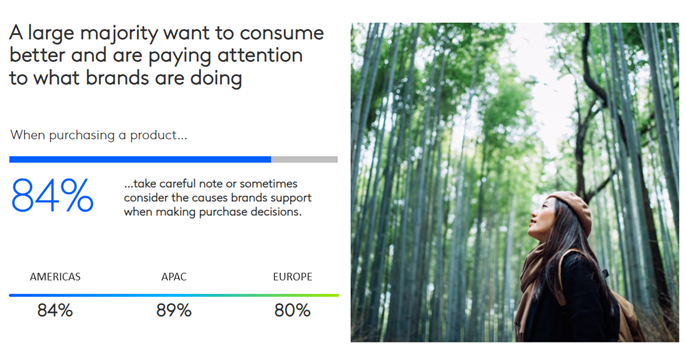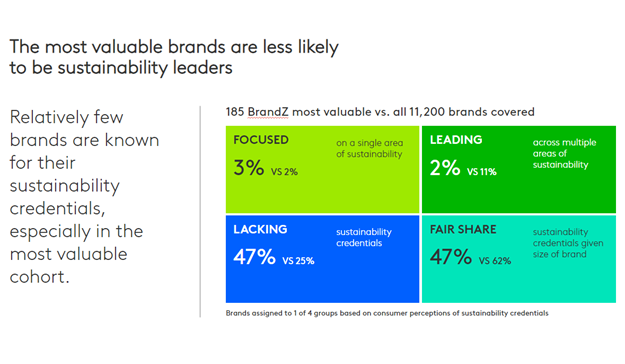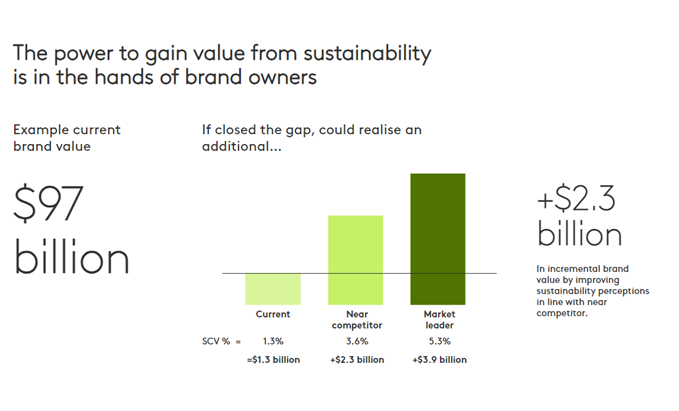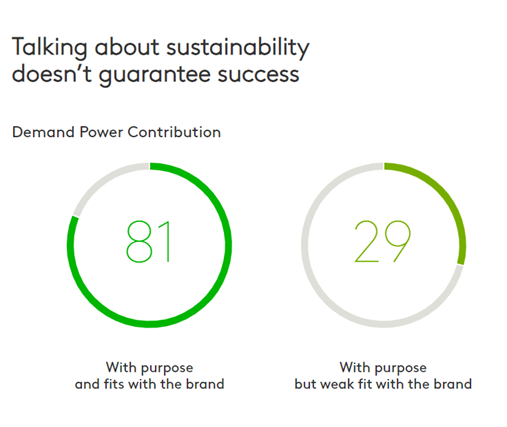This content is a summary of the Sustainability Value Case for Brands Building webinar, available on demand here.
Let’s consider where value sits in people’s lives today. The last couple of years have had an unprecedented impact on people's finances and personal lives, and inflationary pressures, uncertainty and volatility continue. Everybody has had their freedom for discretionary spending reduced, hence there’s heightened focus for consumers and businesses alike on demonstrating value, the maximum ‘bang for buck’.
We have traditionally considered value purely in functional terms, paying a fair price for good and trusted quality. As lives became busier and technology developed, the idea of convenience grew in importance, with consumers and brands recognising that convenience was worth paying more for.
Today value continues to shift, moving beyond the functional to include emotional and intangible benefits. We now value brands and products for their ability to bring joy and new experiences to our lives, by connecting with our values as individuals, or by serving a higher purpose for society or the planet.
There's evidence from around the world that many consumers want to consume better and are paying attention to what brands are doing. 84% of people globally said they take careful note of, or sometimes consider, the causes brands support, when making purchase decisions. Kantar’s Global Monitor shows that 80% of global consumers like it when companies make it clear what they stand for and stay true to their values.

It is clear that consumers do care about sustainability and expect businesses to act. 64% globally say it is business's responsibility to solve climate and environmental issues. We can even see this playing out politically. In a recent Rewired Earth survey, when looking at the populations of the UK, US, South Africa and the Philippines, 75% of people were going to take into account sustainability and the SDGs when voting in elections.
Secondly, cost is clearly a barrier for consumers to act. We see that 43% find it harder to act sustainably due to financial or social constraints.
And lastly, business needs a return on investment - and sustainability of course carries a cost. Business ESG actions cannot be light touch, such as messaging only, as this opens the door to greenwashing accusations.
"Sustainability goes from environmental responsibility to social responsibility. We want to be authentic and genuine in what we say and do. As soon as we over-promise, or things are different than we planned, you can quickly get the perception of greenwashing". Veronique Parmentier, Global Head of Insights, Zespri
Change must involve truly transformative action across the business, including innovation supply chains, processes, operations and the business model, so capital investment is therefore required. However, 35% of marketers tell us that the way business thinks about P&Ls, in not treating profit and planet more equally, is a challenge preventing sustainable transformation. This is the joint biggest barrier identified in the Sustainable Marketing 2030 study we conducted with the WFA. With all this in mind, understanding how sustainability is part of value creation is critical.
How are brands performing vis a vis the sustainability opportunity?
We calculate the contribution to brand value that sustainability can have using the massive Kantar BrandZ dataset, covering 1000s of brands, over 50 markets and 25 years of data. This includes 10 years of data consistently measuring environmental, social and some governance metrics.
To get a sense of how the biggest, most valuable brands in the world are perceived to be doing on sustainability, we devised a brand segmentation. We identified brands that are seen as leading, focused, have their fair share or are seen as lacking in sustainability. Interestingly, relatively few brands are known for their sustainability credentials, especially in the most valuable brand cohort, where currently only 2% of them are seen as leading, versus 11% in the wider BrandZ database of over 11,000 brands.

This isn't predetermined however, and can change with genuine action, transformation and investment.
Can we put an actual number on the sustainability opportunity?
The good news is that there is evidence of a return on investment being very possible. For the BrandZ global top 100 most valuable brands, the dollar value that sustainability contributes is $193 billion. Even in this cohort, the sustainability contribution to value varies enormously. There is a staggering 20 times difference between the lowest contribution and the highest contribution.
This shows there is a lot of value left on the table by brands not taking action and an enormous opportunity to do good for people, the planet and business. Let’s look at an example here of the total value of a brand in the BrandZ global top 100, $97 billion. The current sustainability contribution to value for that brand is 1.3%. If this brand were to increase sustainability contribution to value in line with the near competitor, it would add $2.3 billion to its brand value.

What impact is there on longer term growth and brand equity?
As well as unlocking value, BrandZ data tells us that sustainability credentials support brand growth in the longer term. Brands with a high sustainability contribution to value have on average seen 20% greater growth over four years, than those with a low sustainability contribution to value. Sustainability has boosted growth and shielded from economic shocks over this period.
The value add potential and growth trajectory justify that the investment is the right thing to do, and sets businesses up to be in a more sustainable business model for the future. It also mitigates the risks to business from not taking action.
The contribution to value and brand growth are due to sustainability perceptions having an impact on brand equity. Again, with BrandZ we can show the influence sustainability has on this. 6% overall, and 5.4% at driving demand for the brand or volume, and 6.5% for driving margin growth or pricing power.

These numbers are an average across markets, brands and categories. It might be much higher for your brand, market or category, so it's important to measure these perceptions and links to your KPIs as well.
Sustainability – a key element of building stronger brands
Sustainability sits alongside many other levers we are all very familiar with, to build brand value. Most important of these are the fundamentals of a brand's category, things like experience or functionality, which count for 70% of brand equity.
If the basic fundamentals contribute the most to brand value, sustainability has to be part of that. It must be part of a great experience or product, wholly genuine, involve no compromises and be an integral part of what makes the brand meaningfully different, authentic and credible.
Three key watchouts for brands
Firstly, it's important to remember when metrics are based on consumer perceptions, perception and reality can differ. Consumers can think brands are doing a great job, but the reality can be very different. Or think a brand is not doing well, when it really is.
Consumers today are sceptical about sustainability claims, as half the global population say they have seen or heard false or misleading information about sustainable actions taken by brands. This shows the potential misalignment of views and reality is at a large scale and needs to be rectified so brands can build value for business, people and the planet with their sustainable actions.
The second watchout is about comms. It is essential for sustainability to be part of executing the category fundamentals brilliantly. But execution also comes down to communications, which need to be done brilliantly to have an impact.
When we look at the Global Link database, ads that have a purpose message that also fits the brand, have a much stronger contribution to building brand equity, than purpose ads with a weak brand fit. Getting the creative execution basics right, like enjoyability. involvement, being well branded etc, are also fundamental. A dull execution wouldn't be attention grabbing, just because it carries a sustainability message.
‘The swords and shields analysis that Kantar did a few years ago helped us to identify the most important elements to work on and to communicate. Health & wellbeing – one of the UN’s Sustainable Development Goals - was most important for our consumers and had the strongest impact on their willingness to pay for our brand’. Veronique Parmentier, Zespri
‘Climate action is consistently coming out (in research) as one of the top four priorities. So, while the people-focused SDGs are really critical, climate is consistently as one of the more planet-focused SDGs, right at the top. All brands need to be thinking much more clearly and coherently about how they tell that story in terms of what they're doing from a climate perspective’. Rupert Pearce, founder and CEO of Rewired Earth
Finally, Kantar’s Sustainability Sector Index shows us that brands are often perceived favourably, and categories more critically or realistically. Brands are tangible to us, they have personalities and we have many positive experiences with them, so we are more positive about them, than categories more broadly.
Brands that really want to lead on sustainable transformation, be a positive force in the world and build value from it, need to take action beyond just your brand. Be part of making sustainability more important for your consumers in your category. Raise the bar with how far you go with your brand to lead on it and force the wider category to step up.
Sustainability is critically needed – and can absolutely bring benefits to brands, both ethically and financially.
‘We need to make sure sustainability stays right front and centre of our focus, because it is the most critical issue of our time. If we don't solve this collaboratively, then there won't be any planet for us to exist on. To that end, number one is that brands need to collaboratively and collectively think about how they're going to solve the supply chain’. Rupert Pearce, Rewired Earth
This content is a summary of the Sustainability Value Case for Brands Building webinar, available on demand here.

